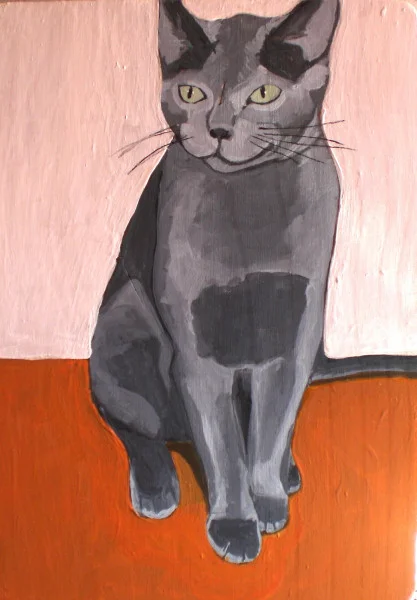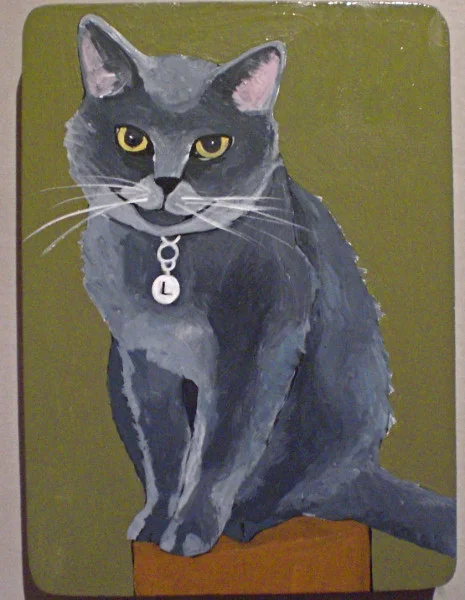He's my Batman, and he's my Robin. They are Jack and Louie, respectively. And they have been a part of my life for as long as I can remember. My dear, gray kitties, my two adorable sons ' and they are both living with cancer.
'Kitty Cancer.' Two words no pet owner would ever, ever want to hear from the veterinarian. But it happened to me, twice. And unfortunately it could happen to you, too, or someone you know.
We don't often read stories about our animals being diagnosed with and treated for diseases like cancer. Usually the pages of newspapers and magazines and the television and radio waves are reserved for heartbreaking human struggles with illnesses, the latest in research for cures and treatments in human medicine, or coverage of this walk or that marathon to raise money and awareness for certain diseases. And rightly so. However, there's another story here.
What often does not get attention is the unique pet-owner experience of living with and caring for pets who have a serious illness, the struggles you and your animal go through, the connections you make along the way, and the importance of maintaining hope and humor as you strive to make your pet's (or pets') journey as easy as possible.
Jack (Batman)Jack (aka my Batman) was my first baby boy. Now 14 years old, he is a handsome Russian Blue who can take your breath away with his deeply intense jade green eyes. When I pick him up, he lets me hold him like a newborn and gives me kisses in my ear. Very George Clooney. Upon seeing him, no one would ever guess that he has been living with cancer since September 2006!
I knew something was wrong when he started having tummy problems, and Jack's regular veterinarian made a couple of diagnoses, neither of which I thought was correct. (Pet owners know their animals in the way parents know their children — like no one else.) They did some tests, and the lab work confirmed my worst nightmare: When I looked at the results, all I could see was 'lymph'-this and 'lymph'-that. Lymphoma. Jack was given between three weeks and three months to live. Crushed, I promptly took Jack for a second opinion.
Somewhat by accident, I ended up at San Francisco Veterinary Specialists in the Mission District of the city. (Yes, there are specialists for our animals, just as there are specialists for humans!) During our first appointment with SFVS oncologist Dr. Carlos Rodriguez, I told him that he'd better be like David Blaine and pull some magic tricks out of his doctor's bag — that we were going to treat this cat's lymphoma. Jack was going to be all right.
Lymphoma is a type of cancer that involves cells of the immune system (called lymphocytes). Cats have a higher risk of suffering from lymphoma than people or dogs do. And Jack fits right in with the statistics: Male cats between the ages of 9 and 13 have the highest risk of developing feline lymphoma. Depending on the kind of lymphoma, the cancer can affect the abdominal area, the spleen, the liver, the chest cavity or the digestive tract, among other areas. Symptoms depend on the kind of lymphoma the cat has.
In his bright Hawaiian shirt, Dr. Rodriguez gave me hope. He told me that he would be with Jack and me every step of the way. And that he would help me decide, if the time came, whether Jack's quality of life did not warrant further treatment. So we began a regimen of fluids and all kinds of medicine, and this Wonder Cat of mine has been living with lymphoma for over a year and a half now.
Of course, it has not been easy. I would wake up in the morning and ask myself, 'Can I commit to this? To taking Jack to the vet every week? To seeing his energy levels go up and down? To worrying about whether he is suffering?' But with continued support from the doctors and staff, along with my friends and family, Jack and I continued along our path.
In fact, we hit him so hard with the treatments that he developed feline diabetes. And so to another specialist at SFVS we went, this time to Dr. Craig Maretzki, who is an internal medicine doctor. We began treatment for his diabetes, but sadly Jack did not respond to the insulin. Dr. Maretzki got a bit creative for us, thankfully, and suggested switching Jack's diet. And, believe it or not, the simple change in food cured his diabetes. How grateful I was to Dr. Maretzki and his staff for not giving up on my Jack, for trying whatever they could think of!
Jack continues to be my home's resident king, taking his spot in his warm cat bed and watching over everyone and everything. I am so proud of my Jack for defying his original prognosis, and of the doctors and staff at SFVS for helping us so much along the way.
Unfortunately, our stories do not end there. Just a few months ago, Louie (Robin, to Jack's Batman) received some very bad news. He was diagnosed with the 'silent cancer' — stomach cancer. Truly, I thought, this must be a pet owner's worst nightmare.
Eleven-year-old Louie is an extremely sophisticated British Short Hair, and I tell him that he is every senior girl's dream prom date, with hiscute, chubby cheeks and dimples that you can see when he purrs. (Really, he would look great in a powder-blue tuxedo.)
I had originally taken Louie in to SFVS just to show him off: 'Here is my healthy, sweet kitty!' Dr. Maretzki was holding him and suddenly asked if he could keep Louie for a few hours. Of course I gasped and imagined the worst. And, sadly, soon I received the horrible news about Louie's stomach cancer.
All of the research I had done on Jack's lymphoma didn't help me much with this, because stomach cancer is a whole new ballgame. The treatment is completely different, as is the prognosis. They call it the 'silent cancer' because the symptoms start out barely noticeable, and then the cancer progresses secretly until it is so severe that treatment is difficult. Symptoms can include a wide range of issues, from lack of interest in food, to vomiting, to lethargy and anemia.
With Jack doing okay, we promptly began hitting Louie's cancer hard with chemotherapy treatments. One a week. Every Friday. Luckily, I had already established a good relationship with Drs. Rodriguez and Maretzki and the oncology staff, so they had my trust and confidence. I knew that they loved Jack and would come to love Louie, and would do anything and everything they could to save their lives.
Week One. Week Two. Week Three. By the third week, the doctor did an ultrasound to check the status of the stomach cancer. Surprise! It was gone! Louie showed no cancer on the ultrasound. I was elated beyond belief. Week Four. Week Five. Week Six. Oh, no. Week Six. Louie began vomiting and wasn't interested in his food. I knew something was wrong. The ultrasound confirmed my fear: The cancer was back.
As I write this, we are still hitting Louie's cancer with everything we've got. He's even gained a little weight. The one thing they don't tell you about chemotherapy — it changes taste buds. One day, Louie will go nuts for the 'Sliced Chicken' canned food; the next day he won't have anything but 'Ocean Fish.' It's trial and error, really. One day I popped open 22 cans of cat food, letting Louie smell the different flavors, until he decided on one he liked. (People will do anything for their animals.)
Some people may think the idea of putting a pet through the process of chemotherapy is cruel, but I can safely say that it's not. Chemotherapy treatment affects animals completely differently than it does humans. They experience fewer side effects than we do: Their hair doesn't fall out (although sometimes kitties' whiskers disappear); they don't get the terrible nausea that humans experience; they might even gain a little weight, as my Louie has.
People ask me how in the world I cope with having two sick kitties. And I tell them that they are my best friends. That I'll do anything in my power to make their lives happy and comfortable. And that when it no longer makes sense for us to continue on, we'll make that call. I can rest easy in the fact that the doctors, staff and I are all part of a team — a team that always has Jack's and Louie's quality of life as the top priority.
For a pet owner who may have just found out the sad news that an animal is sick, I would encourage her to always, always get a second opinion — just as she would if it were her child, spouse or self. Frankly put, there are more alternatives for treating our pets' illnesses than bad medicine and euthanasia. Lots more. With recent advances in the detection and treatment of various diseases, people and their pets have more options, and hope, than ever before.
Find a veterinarian whom you can trust completely, can rely on, and can have a 'lay-it-all-out-on-the-table' conversation. See a specialist if you can, as they may know of treatments and options that a general veterinarian might not be aware of. Work with them to constantly surmise the pet's quality of life. Lean on them to help you make the tough decisions. Jack, Louie and I have been blessed to not only find doctors at SFVS like this, but who also make us laugh along the way, who make us remember that hope is so, so important.
I would also encourage the pet owner to do loads and loads of research on the specific type of illness her pet has. Understanding the disease, its symptoms and mainstream treatments, along with any alternative treatments, goes a long way.
I often think about the fact that people who have had animals with cancer are in some ways better prepared to deal with the news of a loved (human) one who is diagnosed with the disease. They will have done the research and will know what the options are. They will have gone through the schedules of treatment and experienced the various states of shock and worry and frustration and hope and all the rest.
Another thing to consider is the fact that there's an increasingly large intersection between the cancer research being done for human medicine and that being done for our pets; each stream helps and feeds into the other. My hope is that someday, with all the promising, groundbreaking research going on in the biotechnology community, we'll have new therapies with which to tackle cancer. (Think effective, economical gene therapies that target an individual's specific cancer, as opposed to the traditional chemotherapy route, which may or may not work. It's not so far off.)
There is not one minute of the day that I don't wonder, 'How's Jack doing today? What's Louie feeling like right now?' I worry about how Jack will feel if Louie goes away, and how Louie will feel if Jack goes away. They've been together — and with me — for so long now. But they are not ready to leave me just yet. And I know that they'll let me know when the time arrives. In the meantime, I need to go out and buy some more cat food tins.

